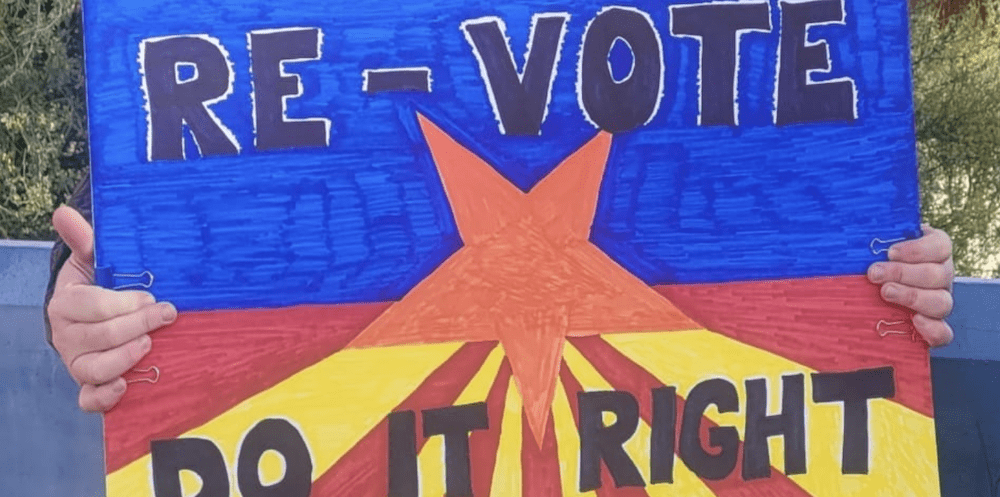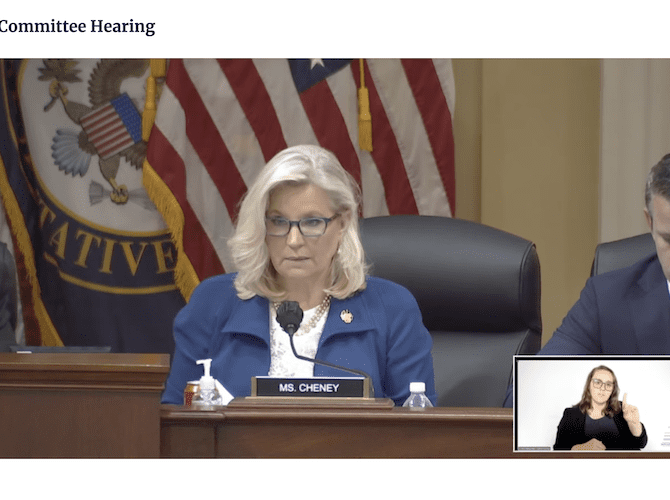Arizona Republicans Increasingly Rejecting MAGA Candidates, Data Finds

(Image: www.facebook.com/photo/?fbid=444141447881221&set=pcb.444141681214531)
In 2020’s presidential election, Fox News called Arizona early for Joe Biden – enraging Donald Trump and his supporters, who quickly claimed the election was stolen. In 2022, Kari Lake, the Trump loyalist running for governor, issued similar cries when the vote count revealed that she had lost her race to Democrat Katie Hobbs, then secretary of state.
Not everyone jumped to conspiratorial conclusions. A trio of retired election technologists and analysts with years of experience parsing every ballot for voting patterns was first to issue a factual explanation of what had happened. In 2020, the researchers – a Democrat, Republican and independent – found that tens of thousands of voters in greater Phoenix and Tucson voted for most of the Republicans on their ballots, but not for Trump.
The analysts have since updated their research with Arizona’s 2022’s results and 2024’s closed presidential primaries. Their findings, which are not a poll or estimate but are based on parsing every vote cast on every ballot, found that growing numbers of Republicans are rejecting conspiracy-minded candidates. Moreover, these otherwise loyal Republicans voted for Democrats in numbers that led to Democratic victories in those contests.
“The result indicates growing disenchantment and a significant uptick in voter disgust manifested by a surge in cross-party voting,” wrote Larry Moore, lead author and the retired founder and CEO of Clear Ballot, a federally certified firm specializing in auditing every vote cast. “The findings suggest a challenging landscape for MAGA-aligned candidates in 2024.”
With scores of 2024 federal and statewide candidates who still claim that Trump did not lose in 2020, their Arizona analysis – in a key battleground state with outsized influence – suggests that the public is tiring of stolen election conspiracies. Moreover, it points to a split-ticket voting pattern that may anticipate that will unfold this fall – as Trump and many GOP candidates continue to attack elections and Trump faces other legal jeopardy.
The researchers, who call themselves “The Audit Guys,” also included Tim Halvorsen, Clear Ballot’s former chief technology officer, and Benny White, a retired pilot, lawyer, and longtime election analyst for the Arizona Republican Party. Their latest work was vetted by academics who have studied election technologies and are familiar with the data used.
The team analyzed a massive spreadsheet (or database) called the cast vote record that lists every choice and vote on every ballot. It is the only election record that reveals who voters did and did not vote for. For varying reasons, most political scientists, pollsters, media, and political parties do not conduct or publish similar voting-pattern analyses.
After 2020’s presidential election, the trio was first to document that otherwise loyal Arizona Republicans – those who voted for a majority of GOP candidates on their ballot – did not vote for Trump. That analysis focused on two counties where more than 70 percent of Arizona voters live. Their latest analysis revisited that research and found “disaffected” Republicans in 2020 and 2022 voted for the Democratic candidate over Trump or Trump loyalist candidates in sufficient numbers to affect the race’s outcome.
“The Republican base eroded from 2020 to 2022 as a growing number of voters cast their ballots for Republican candidates down-ballot but not for the top of the ticket,” their report said. “More troubling for Republicans, an increasing number of voters didn’t simply skip the top of the ticket or cast protest votes for write-ins or third-party candidates but voted Democratic while supporting Republican candidates for lower office.”
“These [cross-over] voters gave victories to Joe Biden over Donald Trump (0.31%), Mark Kelly over Blake Masters (5%), Katie Hobbs over Kari Lake (0.7%), Adrian Fontes over Mark Finchem (4.8%) and Kris Mayes over Abe Hamadeh (0.01%) in races for President, U.S. Senate, Governor, Secretary of State, and Attorney General,” it continued.
There was “a slight increase in the Disaffection index for GOP voters, from 6.2% [in 2020] to 7.1% [in 2022],” the report said. “Over the same time, the percentage of disaffected Arizona Republicans who cast ballots for Democrats (i.e., Disgust index) grew from 65% to 86%.”
While there was a similar pattern of disaffected Democrats in 2020 – those supporting Sen. Bernie Sanders’ presidential candidacy or voting for Trump – the size of that bloc of voters paled in comparison to “disaffected” and “disgusted” Republicans.
“In 2020, 3.6% of Joe Biden’s Arizona vote came from disgusted Republicans. In 2022, the top of the Democratic ticket got 5.6% of its votes from disgusted MAGA-supportive voters,” the researchers said. “In contrast, the percentage of the MAGA vote from disgusted Democratic-supportive voters declined from 2.2% in 2020 to 0.6% in 2022. This data confronts the “whataboutism” arguments [conspiracies and false claims] with facts.”
Looking at 2022’s governor’s race – where lawyers for Lake, who is now running for Senate, told a court in late March that she had “defamed” Phoenix’s top election official (a Republican) by lying about her loss – the researchers noted that “4.2% of Democrat Katie Hobbs’ support – 33,0412 votes – came from disgusted Republican-supportive voters. By comparison, Hobbs’ margin of victory was 17,117 [votes].”
These trends appear to be continuing in 2024’s closed presidential primaries, they said.
“In the Arizona primary on March 19, 2024, two weeks after Nikki Haley suspended her campaign, 21% of voters in Arizona did not vote for Trump—a measure of disaffection with the presumptive nominee,” the report said. “By contrast, Biden’s Index of Disaffection in Democratic closed primaries is 13% – higher than in 2022 – but there is little indication that voters disaffected with Biden will vote for Trump.”
These findings suggest that cross-party voting will continue in 2024’s presidential election as Trump – and scores of GOP candidates following his cues will be on the general election ballot. Moreover, many polls have found notable numbers of Republicans are reluctant to vote for Trump if he is convicted in any of the lawsuits and prosecutions he now faces.






